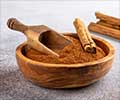Cinnamon can help reduce high blood glucose levels in people with type 2 diabetes, says a new analysis published in the Nutrition Journal.
The analysis by the University of Peradeniya, Sri Lanka, suggests that cinnamon has the //potential to be a useful add-on therapy in diabetes management.The analysis finds an improvement in glycemic control in both patients who received cinnamon as the sole therapy for diabetes and pre-diabetes. In animal models, cinnamon reduced the levels of postprandial plasma glucose and glycated hemoglobin.
Diabetes and Complementary Medicines
Diabetes mellitus, commonly referred to as diabetes, is a metabolic disorder characterized by defective insulin production and abnormal metabolism of blood sugar.
The World Health Organization (WHO) estimates a prevalence of 347 million individuals with diabetes worldwide in 2015. According to the UN health agency, increasing the prevalence of diabetes is one of the main causes of mortality and morbidity worldwide.
Complex treatment regimens and side effects of drugs have been compelling reasons that limited patient compliance with conventional therapies. Worldwide, the trend for the use of CAMs in diabetes has increased overall prevalence ranging between 30-57 %.
Integrative medicine is a new discipline of medicine. The practice combines conventional therapies with evidence-based complementary therapies. Due to the issues with conventional therapies, patients with diabetes are keen to try out integrative strategies that involve lifestyle changes. The study assumes significance as most of the patients with diabetes shows readiness to be part of their disease management and want to self-manage the treatment.
Cinnamon has been used since ancient times for remedial purposes. Recently, cinnamon has become a hot subject in diabetes research. Cinnamon is currently marketed as a remedy for obesity and diabetes. This Peradeniya study shows that cinnamon has the potential to lower blood sugar in animal models and humans.
Cinnamaldehyde, an organic compound in cinnamon, orally fed to diabetic rats, caused notable reduction of plasma glucose and increased insulin levels. The researcher concluded that the compound was accountable for increasing insulin secretion from pancreatic β cells and thus improving glucose levels.
However, the researcher acknowledges that the current evidence to establish the efficacy of cinnamon for diabetes treatment is inconclusive and long-term trials are needed. Also, high coumarin content of Cinnamomum cassia is a concern. Instead, we can use Cinnamomum zeylanicum with its low coumarin content.
References
http://nutritionj.biomedcentral.com/Source-Medindia















